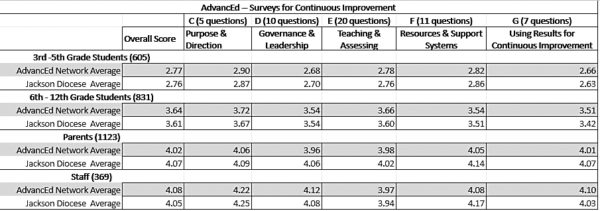By Catherine Cook
JACKSON – Classes are underway in all schools across the Diocese of Jackson. In this edition of Mississippi Catholic, readers can find updates on school accreditation, character education through athletics, how Catholic identity is being enhanced in every school, improvements being made to curriculum, news on school expansions and new administrators.
In addition to new faces, new administrators and new construction, the Office of Catholic Education has begun a system-wide accreditation process to have all 13 Catholic schools accredited by AdvancED, the accrediting agency formed by the merger of the PreK-12 school division of Southern Association of Colleges and Schools (SACS) and North Central Association (NCA) Commissions on Accreditation and School Improvement in 2006 and later including the Northwest Accreditation Commission (NWAC) making it the largest association of educational professionals in the world. The Diocese of Jackson joins 52 (arch)dioceses and Catholic school systems from across the U.S. already accredited this way..
Stephanie Brown, coordinator of school improvement, is leading this process. Brown worked with the Office of Catholic Education last year on a part-time basis assisting with the ongoing curriculum review and initiating the AdvancED process and began in a full-time capacity in July. She comes to the education office from Madison St. Anthony School where she served as a teacher, the coordinator of religious education, and the assistant principal.
The diocese has a significant history with AdvancED through its affiliation with SACS. Many schools were accredited by SACS during the mid 1970s and 80’s. Natchez Cathedral, Madison St. Joseph and Vicksburg Catholic were accredited by SACS in 1975, Holly Springs Holy Family in 1978, Greenville St. Joseph in 1980, Columbus Annunciation in 1984, Southaven Sacred Heart and Jackson St. Richard in 2004, and Madison St. Anthony in 2012. The four remaining schools that have not been affiliated with AdvancED will be accredited through this system-wide process.
This accreditation process uses a set of rigorous research-based standards to examine individual schools, as well as, the diocese as a system to determine how well the schools and the diocese are meeting the needs of students. Continuous improvement is at the core of this process. All efforts in the accreditation review are directed toward examining data – surveys, achievement scores, classroom observation data, etc. for ongoing improvement of student outcomes. The standards are grouped within three domains: leadership capacity, learning capacity and resources capacity. Additionally, AdvancED partnered with the National Educational Association to incorporate the Catholic School Standards so that we can be assured that the uniqueness of Catholic education is recognized and supported.
The system-wide process began for Catholic schools here last spring with surveys sent to students, parents, and staff at each school.

The results of the surveys indicate that the parent ratings were slightly higher than the AdvancED network average, the middle/high school student ratings were slightly lower than the network average with staff and elementary student ratings slightly lower in some areas and slightly higher in other areas. While this is a cursory view of the diocese a deep dive into the data is available at each school location as reports provide ratings for each of the 53 questions within the five areas of focus. One report presents the five highest scoring items and the five lowest scoring items for each of the stakeholder groups. This data assists the diocese and each school in determining areas that need improvement and areas of strength on which to build. Principals and pastors have received a report of the survey results specific to their school. Once individual schools have determined their areas of focus for improvement we determine how the diocese can support those areas..
Another diocesan-wide effort is Play Like a Champion (PLAC) coordinated by Amy Lipovetsky who came to the diocese from Florida where she served as a district level athletic director. She and her family moved here in 2016, and she serves as youth director at Madison St. Francis of Assisi Parish and coaches middle school volleyball at Madison St. Joseph School. Lipovetsky works with all schools and parishes in our diocese that have athletic programs. Play Like a Champion Today: Character Education through Sports is rooted in Catholic teachings and traditions. The program places emphasis on coaching as a ministry and the role of sports in moral and spiritual development. PLAC provides resources for coaches, parents, and students including prayers and reflections, as well as, information bullying and hazing, handling failure and success and first aid, to name a few. Find out more at www.playlikeachampion.org.
(Catherine Cook is the superintendent of Catholic education for the diocese.)

